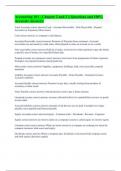Exam (elaborations)
Accounting 101 - Chapter 2 and 3 || Questions and 100% Accurate Answers.
- Module
- Institution
Asset Accounts correct answers Cash - Accounts Receivable - Note Receivable - Prepaid Accounts (or Expenses) More Assets Cash correct answers A company's cash balance Accounts Receivable correct answers Promises of Payment from customers. Accounts receivables are increased by credit sales; of...
[Show more]



